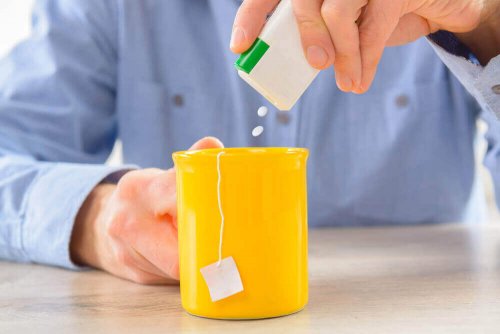Can Diet Soda Make You Gain Weight?

Currently, diet soda is replacing many sugary sodas and other drinks. Worrying about gaining weight leads many of us to opt for drinks lower in calories. However, can diet soda have the opposite effect and actually make you gain weight?
You might like: Three Weight-loss Diets that Don’t Endanger Your Health
In no case should soft drinks replace water as a hydration drink for the proper functioning of our body.
Diet soda
The risks of consuming diet soda
Sugar-free sodas are soft drinks that don’t contain any sugar and instead contain alkaline sweeteners, such as aspartame, saccharin or cyclamate. Although sugar-free soft drinks contain no calories, the sweeteners favor the absorption of sugar into the intestine.
In addition, they promote insulin secretion in the same way as sugary sodas. Therefore, blood sugar decreases, thereby causing a feeling of hunger.
Sweeteners also affect the intestinal flora, modifying the bacteria in the body. As a result, this also produces dysbiosis and glucose intolerance.

You might like: Excessive Salt or Sugar Intake: Which Is Worse for Your Health?
Diet soda and weight
Researchers are increasingly studying the relationship between diet soda and weight. The studies aim to figure out if sugar-free soft drinks can cause weight gain, as it’s a subject of such great controversy.
The latest published study, Sugar and artificially sweetened beverages linked to obesity: a systematic review and meta-analysis, shows an association between soda consumption and obesity.
However, it’s important to clarify that this study doesn’t distinguish between sugary sodas and sugar-free diet sodas. The results show that the consumption of soft drinks, whatever their sugar content, is higher in people with obesity.
Other studies suggest that sugar-free drinks, apart from raising the risk of obesity, may increase the chance of cardiovascular disease. However, there is no clear evidence as to why this occurs.
On the other hand, there are studies, like this one by Plos One, that show the link between the consumption of diet soda and a greater amount of abdominal fat. According to this study, diet soda may not be effective as a measure to control weight.
Why could diet soda make you gain weight?
The compensation effect
Sugar-free drinks may not cause weight gain on their own, but they are related to unhealthy lifestyle habits.
You probably think that the calories you are going to save in that soda can be replaced by consuming more caloric food. For example, compensating for eating a hamburger with fries by drinking diet soda is not a reliable way to control your weight.

They can increase hunger
To reiterate, these sodas can trigger the feeling of hunger in those who consume them.
In some cases, the insulin high you experienced when you consume sucralose is accompanied by a decrease in glucose levels.
This means that your body reacts to sugar-free soft drinks the same way it reacts to regular soda. The only difference is that the sugar doesn’t actually enter the body.
Sweetness causes addiction
It has been shown that eating very sweet foods, whether or not they provide calories, frequently activates brain areas related to pleasure and reward, leading to an addiction to very intense flavors and sensations. The effects of sweet foods on the brain cause the same sensation as using a drug, so you tend to want to eat more and more sugar.
Conclusion
If you want to lose weight, it seems logical to replace sugary sodas with sugar-free sodas. So far, it’s been shown that, in moderate quantities, they are safe and don’t contain calories.
However, science shows that drinking diet soda regularly doesn’t help weight control since it can cause you to eat more and gain more abdominal fat.
Weight gain is quite complex and you can’t blame a single group of foods, products, or even sugar. With that said, your main beverage should be water, both during and between meals.
However, what if you want to have a soda? What do you choose, diet soda or regular soda? You can opt for diet soda occasionally since no negative effects are found when consumed in small quantities.
All cited sources were thoroughly reviewed by our team to ensure their quality, reliability, currency, and validity. The bibliography of this article was considered reliable and of academic or scientific accuracy.
- Chia, C. W., Shardell, M., Tanaka, T., Liu, D. D., Gravenstein, K. S., Simonsick, E. M., … & Ferrucci, L. (2016). Chronic low-calorie sweetener use and risk of abdominal obesity among older adults: a cohort study. PLoS One, 11(11), e0167241.
- Pereira, M. A. (2014). Sugar-sweetened and artificially-sweetened beverages in relation to obesity risk. Advances in nutrition, 5(6), 797-808.
- Ruanpeng, D., Thongprayoon, C., Cheungpasitporn, W., & Harindhanavudhi, T. (2017). Sugar and artificially sweetened beverages linked to obesity: a systematic review and meta-analysis. QJM: An International Journal of Medicine, 110(8), 513-520.
- Suez, J., Korem, T., Zeevi, D., Zilberman-Schapira, G., Thaiss, C. A., Maza, O., … & Kuperman, Y. (2014). Artificial sweeteners induce glucose intolerance by altering the gut microbiota. Nature, 514(7521), 181.
- Indian Heart Journal. Volume 70, Issue 1, January–February 2018, Pages 197-199. The truth about artificial sweeteners – Are they good for diabetics? https://www.sciencedirect.com/science/article/pii/S0019483218300142
- QJM. 2017 Aug 1;110(8):513-520. Sugar and artificially sweetened beverages linked to obesity: a systematic review and meta-analysis. doi: 10.1093/qjmed/hcx068.
- Adv Nutr. 2014 Nov 14;5(6):797-808. Sugar-sweetened and artificially-sweetened beverages in relation to obesity risk. doi: 10.3945/an.114.007062. Print 2014 Nov.
- PLoS One. 2016 Nov 23;11(11):e0167241. Chronic Low-Calorie Sweetener Use and Risk of Abdominal Obesity among Older Adults: A Cohort Study. doi: 10.1371/journal.pone.0167241. eCollection 2016.
- J Nutr. 2012 Jun; 142(6): 1142S–1148S. Published online 2012 May 9. Sweetness and Food Preference. doi: 10.3945/jn.111.149575
This text is provided for informational purposes only and does not replace consultation with a professional. If in doubt, consult your specialist.









